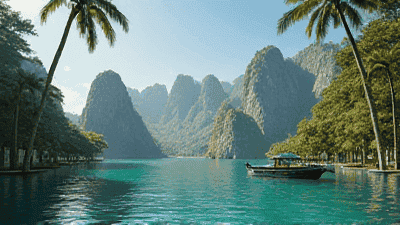
Experience Travel Authenticity: A Comprehensive Guide to Discovering Local Entertainment Gems
Introduction

Travel has long been synonymous with iconic landmarks and curated tours, yet a burgeoning shift is redefining the essence of exploration. This article delves into the profound yet often overlooked realm of local entertainment, moving beyond the well-trodden tourist paths. It posits that true cultural immersion lies not just in witnessing historical monuments, but in participating in the daily rhythms and authentic leisure activities that define a community's unique spirit. This seemingly simple concept of "local fun" unveils a complex tapestry of social, artistic, and culinary mechanisms integral to a place's identity.
The background of this theme is rooted in a growing desire among travelers for more meaningful and authentic experiences, moving away from mass tourism's sometimes superficial encounters. Discovering local entertainment offers multifaceted impacts: it fosters deeper cultural understanding, supports local economies directly, and creates unforgettable, personalized memories that traditional sightseeing often cannot. This approach holds immense value for the scientific community studying cultural exchange, the tourism industry seeking innovation, and society at large promoting global understanding. Current developments highlight a rise in experiential travel, yet controversies persist regarding how genuinely one can integrate into a local scene without disrupting it. Understanding authentic local entertainment is key to navigating these advancements and resolving debates about responsible tourism. What impact would it have on our understanding or practice of global citizenship if we failed to fully comprehend and embrace the rich, living cultures through their everyday expressions?
Embracing Local Rhythms
Defining Authentic Entertainment Beyond Tourist Traps
Authentic local entertainment encompasses the leisure activities, social gatherings, and cultural expressions that are an organic part of a community's everyday life, distinct from attractions specifically designed for tourists. These are the experiences where locals genuinely go to relax, socialize, and celebrate. Examples include bustling farmers' markets (not just souvenir markets), neighborhood music venues showcasing local bands, community-run festivals that predate mass tourism, spontaneous street performances, or humble eateries where generations have gathered. Unlike iconic landmarks which offer a glimpse into history, local entertainment provides a vibrant, living snapshot of a culture in real-time. It's the difference between admiring a grand cathedral and attending a Sunday service there, or visiting a museum's food exhibit versus sharing a meal at a beloved family-run restaurant. This distinction is crucial because while tourist traps often cater to broad, sometimes simplified expectations, authentic experiences offer nuance, complexity, and genuine human connection. Engaging in these activities fosters a sense of belonging and allows travelers to see a destination through the eyes of its residents, moving beyond passive observation to active participation. This deeper engagement enriches the travel narrative, transforming a trip into a journey of discovery. (local market)
Navigating the Local Landscape

Practical Approaches to Discovering Untapped Experiences
Unearthing truly local entertainment requires intentional effort and a willingness to deviate from pre-packaged itineraries. One of the most effective strategies is to engage directly with residents. Hoteliers, shopkeepers, bartenders, and even fellow travelers met in less touristy areas often possess invaluable insights into what's happening locally. They can recommend specific events, hidden cafes, or neighborhood gatherings that wouldn't appear in guidebooks. Beyond direct interaction, leveraging digital resources tailored for local engagement is paramount. Many cities have community-specific apps, websites listing local events, or social media groups focused on arts, music, or food scenes. These platforms, often in the local language, are goldmines for authentic experiences, from pop-up art shows to street food festivals. Exploring less-traveled neighborhoods, away from the main commercial districts, also often reveals the true pulse of a city, where everyday life unfolds without the veneer of tourism.
Furthermore, seeking out local newspapers or free cultural magazines (often found in cafes or community centers) can provide a current snapshot of events. Subscribing to local bloggers or vloggers who focus on lifestyle rather than tourism can also yield fantastic, insider tips. For instance, in Tokyo, instead of only visiting Shibuya Crossing, one might use a local event app to find a small jazz club in Koenji or a neighborhood festival in Setagaya.
Here’s a table outlining key resources for discovery:
| Resource Type | Example Application/Strategy | Benefit for Travelers |
|---|---|---|
| Local Interactions | Ask hotel staff, local shop owners, or baristas | Insider tips, current events, personalized recommendations |
| Digital Platforms | Eventbrite (filtered by local events), Meetup, local city apps | Comprehensive listings, community engagement opportunities |
| Social Media | Facebook groups (e.g., "Things to do in [City] Locals"), Instagram hashtags | Real-time updates, visual previews, community vibe check |
| Print Media | Local newspapers, free cultural magazines in cafes | Authentic local perspective, less commercialized events |
| Exploration | Wander into non-touristy neighborhoods, use public transport | Accidental discoveries, observation of daily life, immersion |
Understanding and utilizing these varied channels significantly increases the chances of stumbling upon those truly unique, locally cherished moments. For instance, a recent study by Expedia found that 69% of travelers now prioritize unique experiences over traditional sightseeing, underscoring the shift towards these immersive approaches. This blend of direct engagement and smart resource utilization is key to transforming a standard trip into an unforgettable cultural journey, making the world feel less like a spectacle and more like a home. (map with pin)
Cultivating Genuine Connections
Engaging Respectfully and Maximizing Cultural Exchange
True cultural immersion transcends simply finding local entertainment; it involves actively participating in a manner that is respectful, open-minded, and conducive to genuine exchange. One fundamental step is to learn a few basic phrases in the local language. Even a simple "hello," "thank you," and "please" can open doors and demonstrate a genuine effort to connect, often eliciting warm responses from locals. Being open-minded means suspending preconceived notions and embracing differences, whether in customs, social norms, or forms of expression. For instance, participating in a local community celebration might involve unique traditions that differ greatly from one's own, but approaching them with curiosity rather than judgment fosters a much richer experience.
Instead of merely observing, seek opportunities to participate. This could mean joining a spontaneous dance at a street festival, trying a local craft workshop, or simply engaging in conversation at a neighborhood pub. Supporting local businesses directly, whether by purchasing goods from an artisan or dining at a family-owned restaurant, is another powerful way to engage respectfully and contribute positively to the community's economic well-being. This approach aligns with responsible tourism principles, ensuring that the traveler's presence benefits the hosts. Remember that cultural exchange is a two-way street; be prepared to share aspects of your own culture if asked, fostering a deeper, more personal connection. This interaction transforms passive consumption into active participation, creating lasting memories and forging meaningful bonds. (shared laughter)
Conclusion

This exploration has highlighted that the true essence of travel extends far beyond conventional sightseeing, advocating for a deeper dive into authentic local entertainment. We've established that genuine cultural immersion lies in the everyday rhythms and leisure activities of a community, contrasting sharply with the often-superficial experiences offered by typical tourist attractions. The article outlined practical strategies for unearthing these hidden gems, from direct engagement with locals to leveraging specific digital and print resources. Crucially, it emphasized the importance of cultivating genuine connections through respectful interaction, open-mindedness, and active participation. By embracing these principles, travelers not only enrich their own journeys but also contribute positively to the communities they visit, fostering a more nuanced understanding of global cultures and reinforcing the value of experiential travel. This approach solidifies local entertainment's position as an indispensable element for truly transformative travel.
Looking ahead, the landscape of travel is poised for further evolution, with an increasing emphasis on hyper-local and sustainable tourism models. Future development trends point towards even more sophisticated digital tools that connect travelers directly with local hosts and niche experiences, bypassing traditional intermediaries. Macro scientific policies might increasingly focus on cultural preservation through responsible tourism, incentivizing initiatives that support authentic local expressions rather than commoditizing them. Challenges remain in balancing authentic interaction with potential impacts on local communities, necessitating continuous research into ethical engagement frameworks. The ongoing iteration of technology, coupled with a growing desire for purpose-driven travel, will likely drive innovations in how we discover and engage with local cultures. The importance of continuous research and open dialogue in this evolving field cannot be overstated, ensuring that as travel advances, it remains a powerful force for understanding, connection, and mutual respect across diverse global communities.
Frequently Asked Questions (FAQ)
Q: How do I start finding local entertainment if I don't know anyone in a new city and don't speak the local language? A: Starting your search for local entertainment in an unfamiliar city, especially without local contacts or language proficiency, can seem daunting but is entirely achievable with a strategic approach. Begin by using universally accessible digital tools. Download general travel apps like Tripadvisor or Google Maps, but instead of searching for "attractions," filter your search for "events," "live music," "markets," or "restaurants popular with locals." Many of these platforms now offer translation features or reviews in multiple languages. Next, seek out city-specific apps or websites that cater to residents. Even if the content is in the local language, browser extensions like Google Translate can provide a rough understanding. Look for sections like "What's On," "Community Events," or "Arts & Culture." These often list smaller, non-touristy happenings. When you arrive, visit public spaces that naturally draw locals, such as neighborhood parks, bustling squares, or local university campuses. Observe flyers on community boards, even if you can't read them entirely; visuals often indicate concerts, festivals, or local sports events. Don't be afraid to politely ask for recommendations from service staff at your accommodation or in cafes – using a translation app for a simple phrase like "Where do locals go for fun?" can work wonders. Often, a smile and a genuine attempt to connect can overcome language barriers, leading to surprising and authentic discoveries.
Q: What are some common etiquette tips for participating in local events to avoid being disrespectful? A: Engaging respectfully in local events is paramount to a positive cultural exchange and ensures you're a welcome participant rather than an intrusive spectator. Firstly, observe more than you participate initially. Take cues from locals on appropriate behavior, dress, and interaction levels. This means waiting to see if clapping is customary, understanding if photography is permitted, or recognizing if an event is more solemn than celebratory. Secondly, dress modestly and appropriately for the context. While casual attire might be fine for a street fair, a religious ceremony or a traditional performance may require more conservative clothing. When in doubt, err on the side of caution. Thirdly, ask for permission before taking photos, especially of individuals. A polite gesture and a "May I?" (perhaps using a translation app) can prevent misunderstandings. If photography is discouraged, respect that immediately. Fourthly, be mindful of noise levels and personal space. Avoid loud conversations, especially during performances or ceremonies, and respect the personal boundaries of those around you. Fifthly, support local vendors and artists respectfully. Haggle politely if it's culturally accepted, but don't undervalue their work. Finally, learn a few basic polite phrases in the local language ("hello," "thank you," "please," "excuse me"). Even imperfect pronunciation shows effort and appreciation, often opening doors to warmer interactions and making your presence more welcome. Remember, you are a guest in their community, and showing deference goes a long way.








